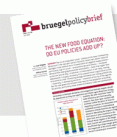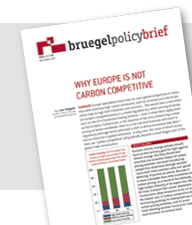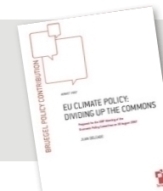Archive for category Climate change
The G8 and the food crisis
Posted by Juan Delgado in Climate change, Food policy, Language: English, Language: Spanish, Op-eds, World economy on July 10, 2008
 La tenue respuesta del G8 ante la crisis alimentaria
La tenue respuesta del G8 ante la crisis alimentaria
 The non-response of the G8 to the food crisis
The non-response of the G8 to the food crisis
Juan Delgado and Indhira Santos argue that although the right issues are on the G8 table, what it is still lacking, after one year of continuously increasing prices, is comprehensive action: the G8 leaders‘ statement on food security lacks a clear plan in the first two policy areas -trade and aid- and remains vague in the field of biofuels.
The latent food crisis
Posted by Juan Delgado in Climate change, Food policy, Language: English, Language: Spanish, Non-refereed journals, Short papers and policy notes, World economy on July 4, 2008
The new food equation: do EU policies add up?, by Juan Delgado and Indhira Santos
Bruegel Policy Brief. www.bruegel.org. Issue 2008/06, 2008.
 This policy brief looks at how EU policies should be adjusted to the higher food prices. The brief makes three policy recommendations: Innovation in biofuels should be encouraged but biofuels targets should be abandoned as they are expensive and distort agricultural and energy markets. Freer trade is needed for both efficiency and food security reasons. But more open markets will further increase the price of food for importing countries. An immediate and sustained aid increase should therefore be agreed.
This policy brief looks at how EU policies should be adjusted to the higher food prices. The brief makes three policy recommendations: Innovation in biofuels should be encouraged but biofuels targets should be abandoned as they are expensive and distort agricultural and energy markets. Freer trade is needed for both efficiency and food security reasons. But more open markets will further increase the price of food for importing countries. An immediate and sustained aid increase should therefore be agreed.
An EU energy market?
Posted by Juan Delgado in Books, chapters and reports, Climate change, Energy, Language: English on June 29, 2008
European Energy Markets: Moving in a Common Direction?, by Juan Delgado
Published in Commodities, Energy and Finance. Morten Balling, Ernest Gnan and Mar Gudmundsson, eds., June 2008. SUERF Studies.
 In this paper for SUERF / OeNB Workshop on “Commodities, Energy and Finance” Juan Delgado outlines the main obstacles to integration of EU energy markets and analyses the potential impact on market integration of the new legislation recently proposed by the European Commission in the fields of energy and climate change.
In this paper for SUERF / OeNB Workshop on “Commodities, Energy and Finance” Juan Delgado outlines the main obstacles to integration of EU energy markets and analyses the potential impact on market integration of the new legislation recently proposed by the European Commission in the fields of energy and climate change.
Environmental market failures
Posted by Juan Delgado in Books, chapters and reports, Climate change, Competition and Regulation, Language: Spanish on April 12, 2008
Fallos de Mercado y Regulación Medioambiental (Market Failures and Environmental Regulation), by Juan Delgado
Published in Tratado de Tributacion Medioambiental (F. Becker, L. M. Cazorla y J. Martínez Simancas, eds., 2008). Editorial Aranzadi. April 2008.
 This chapter analyses different forms of market failures related to the environment. Apart from the classic examples related to the existence of externalities and public goods, the chapter focuses on the effect of uncertainty and asymmetric information on environmental policies and the interaction between environmental market failures and innovation-related market failures. Such overlap of market failures determines that the design of environmental policies is complex and cannot focus on the resolution of individual market failures in isolation.
This chapter analyses different forms of market failures related to the environment. Apart from the classic examples related to the existence of externalities and public goods, the chapter focuses on the effect of uncertainty and asymmetric information on environmental policies and the interaction between environmental market failures and innovation-related market failures. Such overlap of market failures determines that the design of environmental policies is complex and cannot focus on the resolution of individual market failures in isolation.
Europe decides on its climate strategy
Posted by Juan Delgado in Climate change, Energy, Europe, Language: English, Language: Spanish, Op-eds on February 14, 2008
 Europe’s arsenal to fight climate change
Europe’s arsenal to fight climate change
 Las armas de Europa contra el cambio climático
Las armas de Europa contra el cambio climático
Juan Delgado argues that the most efficient way to tackle climate change is to focus on curtailing emissions and provide agents with the freedom to choose by what means to do so. Any complementary target should contribute in this direction and not add additional burdens.
Bali, the prelude to Copenhagen
Posted by Juan Delgado in Blogs, Climate change, Energy, Europe, Language: English on December 11, 2007
EU has gone to Bali with objectives but without strategies, by Juan Delgado
Competitiveness concerns are high on the Bali negotiations. The European Union has put on the table an ambitious agenda committing to reduce emissions by 20 percent (with respect to 1990 levels), increase energy efficiency by 20 percent and increase the share of renewables in energy consumption to 20 percent by 2020. This agenda may however be in conflict with the low carbon competitiveness of EU exports.
Landing Airplanes in Green Europe
Posted by Juan Delgado in Climate change, Language: English, Op-eds on December 11, 2007
Climate change and the competitiveness of Europe
Posted by Juan Delgado in Climate change, European Single Market, Language: English, Short papers and policy notes on October 1, 2007
Why Europe is not carbon competitive, by Juan Delgado
Bruegel Policy Brief. www.bruegel.org. Issue 2007/04, 2007.
 Contrary to what is generally pictured, this policy brief shows that when considering the export mix, Europe is more vulnerable to carbon pricing schemes than other countries and regions. Europe specialises more than its main global competitors in industries with relatively high carbon emissions, such as minerals and chemicals, rather than in high-tech industries and services. This would have a real effect on Europe’s competitiveness in a world regulated by carbon pricing schemes such as the EU’s Emissions Trading Scheme – even if other blocs apply them as the EU does.
Contrary to what is generally pictured, this policy brief shows that when considering the export mix, Europe is more vulnerable to carbon pricing schemes than other countries and regions. Europe specialises more than its main global competitors in industries with relatively high carbon emissions, such as minerals and chemicals, rather than in high-tech industries and services. This would have a real effect on Europe’s competitiveness in a world regulated by carbon pricing schemes such as the EU’s Emissions Trading Scheme – even if other blocs apply them as the EU does.
The cost of fighting climate change
Posted by Juan Delgado in Climate change, Language: English, Short papers and policy notes on August 30, 2007
EU Climate Policies: Dividing up the Commons, by Juan Delgado.
Note presented to the Economic Policy Committee of the ECOFIN on 30 August 2007 (published in Eyes on Europe, Issue 7, November – April 2008).
 Juan Delgado discusses the economic impact of climate change polices. The EU has committed to an ambitious climate change agenda. The challenge facing Europe now is how to meet the targets at a minimum cost and how to allocate the cost in such a way that it has a neutral impact on competitiveness. This note was presented in August 2007 to the Economic Policy Committee of the EU.
Juan Delgado discusses the economic impact of climate change polices. The EU has committed to an ambitious climate change agenda. The challenge facing Europe now is how to meet the targets at a minimum cost and how to allocate the cost in such a way that it has a neutral impact on competitiveness. This note was presented in August 2007 to the Economic Policy Committee of the EU.
What is it a common energy policy?
Posted by Juan Delgado in Climate change, Energy, Language: English, Language: French, Op-eds on June 1, 2007
 Objectives and Instruments of a Common Energy Policy
Objectives and Instruments of a Common Energy Policy
Objectifs et moyens d’une politique énergétique commune
La lettre des entretiens européens, June 2007
Juan Delgado claims that setting policy objectives on energy is not enough for the EU. To make progress, it is crucial that the union moves quickly to create a sound strategy on how to reach the targets. Otherwise the ambition of the new energy policy can end up being its own destruction.

